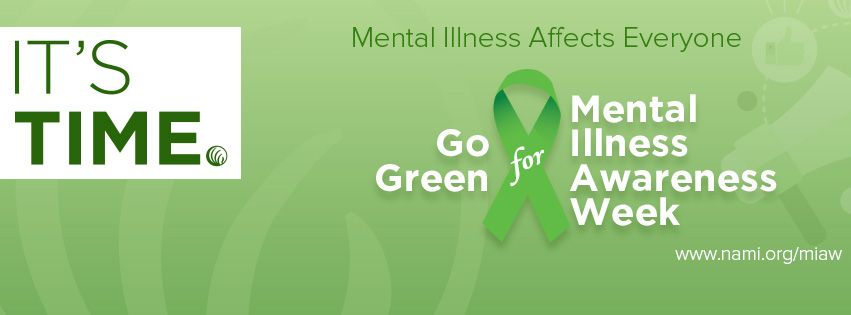This month:
To commemorate the launch of Sarah Griffith Lund‘s new book ― Blessed Are The Crazy: Breaking the Silence About Mental Illness, Family, and Church ― and to participate in National Mental Illness Awareness Week (Oct. 5-11), we invite you to join in a Synchroblog on mental illness, family, and church.
Break the silence by sharing your personal story of how you’ve been impacted by mental illness in your family and/or in your faith community.

October 7 is the National Day of Prayer for Mental Illness Recovery and Understanding.
"Break the silence by sharing your story..." My final post for a while in my tellingthestory label last spring. Socially, professionally, and financially that story I'm trying to tell has been costly beyond anything I could have imagined.
Intro
For starters, the side of my family of origin I know something about has a multi-generational history of severe clinical depression, suicide, bipolar I, panic disorder, agoraphobia... Since my early teen years I've battled "something OCD-ish", panic disorder, and claustrophobia; I also have migraine disorder―as opposed to an occasional discrete migraine episode. Evidence shows those illnesses are closely related. Psychiatry deals with brain function, neurology with brain structure, though you can't separate them! Most medical centers of any size will have a neuropsychiatrist or psychoneurologist (someone boarded in both specialties) on staff. Doctors sometimes prescribe anticonvulsants – technically neurological drugs – to treat depression and mania that formally are psychiatric diagnoses. Sometimes physicians prescribe antidepressants (psych meds) to alleviate neurologically-based migraines and other headaches. Clinicians insist it can be difficult to discern the flat mood of depression from that of psychosis; sometimes you need to wait and see. I'll add there's also the flat affect of some brain injuries.
I try to understand the countless times I've heard or read passionate pleas please to interact with and act toward people with mental/psychiatric illnesses just as you do people with any other physical malady, because, after all, disorders of mood and thought are whole-body diseases. However, for some reason most people seem to miss or evade the fact those illnesses strike at the very heart of a person's humanity, since they profoundly affect thinking and feeling. In other words, in presentation and in social cost, they're anything but simply "another illness." In addition, most people will have an episode that makes them look clinically depressed at some point in their lives.
My Friend C
After pancakes and festivities, last Shrove Tuesday I signed a covenant with a friend: we both promised to keep stayin' alive in the blues. Six weeks plus later, we sat together at the Easter Vigil; at the end of that three-day long Triduum liturgy, after (finally!) the first Eucharist of Easter, I excitedly went to the back of the church sanctuary and rang the bell seven times to proclaim death and resurrection to the surrounding neighborhood! Together at Easter Vigil. C died less than two weeks later. Her blues almost definitely had been the clinical depression she'd told people she was being treated for; you could call my case of the blues "existential depression" due to one thing after another, including fallout from the physical fall and subsequent losses I referenced in my "tellingthestory" posts.
desert spirit's fire! truly is mostly a theology blog rather than reflections on my daily or weekly activities. (Why not a hat tip to my seminary professors who assumed I'd get a ThD or PhD and teach in seminary? They've got one!) You know none of us is faithful—no, not one! At C's funeral, the pastor assured us C was with Jesus and with her parents who had predeceased her. I just noticed the last sentence I typed! Had Jesus the Christ predeceased her? Yes. The preacher assured us C was with her family and with Jesus because of Jesus' infinite faithfulness. Afterwards at lunch in the social hall, C's baptismal certificate was at the top of the display of items associated with her. God irrevocably claimed C in baptism. God keeps covenant. God kept covenant.
Other October Synchroblog Participants:
- Sarah Griffith Lund – Stronger Together
- Liz Dyer – Finding the Courage to Break the Silence
- Stacy Sergent – No Longer Protecting Secrets
- Patricia Watson – Grace Amid Crazy
- Glenn Hager – When Mental Illness Strikes Home
- Crystal Rice – Looking Well on the Outside
- Jeremy Myers – A True Foot Washing Service
- David Hosey – The church, the psych ward, and me
- Ona Marie – Mental Illness, Family, and Church
- Carol Kuniholm – A Prayer for the Broken
- Susan Herman – 3 Self Care Rituals for Managing Tough Transitions
- Eric Atcheson – Blessed Are The Crazy
- Joan Peacock – “Alice in Wonderland”, a Bipolar BookGroup Discussion Guide
- Justin Steckbauer – Mental Illness, Awareness, and Jesus
- Kathy Escobar – Mental Illness: 3 Sets of 3 Things
- Leah Sophia – Mental Illness/Health Awareness
- Josh Morgan – Peace Between Spirituality and Mental Health
- Tara Ulrich – Breaking the Silence
- Sarah Renfro – Blessed Are The Crazy
- Steve Hayes – Mental illness and the Christian faith
- Mindi Welton-Mitchell – Breaking the Silence: Disability, Mental Illness and the Church
- Michelle Torigian – A Life of Baby Steps
- Bec Cranford-Smith – Mental Health and the Pastor
- Loveday Anyim – My Mental Health is your Business

Thank you for sharing this very real, very beautiful post. You are an amazing person.
ReplyDelete